In Symbolic Act Khamenei Plants A Tree Amid Environmental Crisis
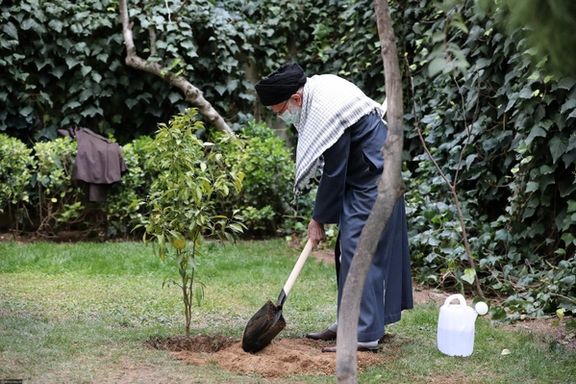
Iran’s Supreme Leader Ali Khamenei has planted two saplings to mark the national Arbor Day, describing planting of a tree as a “religious and revolutionary” action.

Iran’s Supreme Leader Ali Khamenei has planted two saplings to mark the national Arbor Day, describing planting of a tree as a “religious and revolutionary” action.
Khamenei planted the fruit tree saplings on Sunday morning, on the occasion of the national tree planting day.
He urged all government institutions to take measures to preserve the country’s water, soil, and wildlife.
Khamenei said, "The destruction of forests and the environment and vegetation is the destruction of national interests" and called on the authorities to protect trees from profiteers.
Despite Khamenei’s public expression of support for the environment, successive Iranian governments have left a bad record in protection of natural resources.
In December 2021, the head of the forestry scientific association, Ali Banagar, expressed concern about the speed of deforestation in Iran, enumerating the factors that fuel the trend, including the country’s aggressive pursuit of development projects through often illegal constriction of luxury vacation houses, wood smuggling and illegal logging, encroachment on forests and land grabs, forest fires, as well as pollution and landfills.
Hit by the most severe drought in decades, Iran is reportedly increasingly losing its forests and vegetation, with forest acreage having decreased from 19 million acres to 14.4 million between 1900 and 2012, and further shrunk to 10.7 million by 2015.
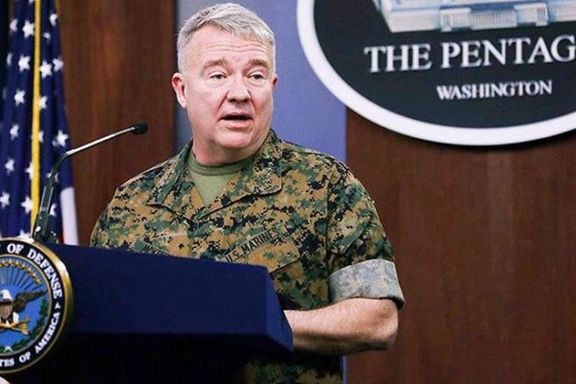
The outgoing chief of the United States Central Command (CENTCOM) says the US will do everything possible to prevent it from producing nuclear weapons.
During his farewell visit before stepping down as the head of CENTCOM, General Kenneth F. McKenzie told Israel’s Hayomthat the Islamic Republic is the region’s “principal bad actor” and “biggest threat to security”.
"We have a couple of goals with Iran”, he said, adding that the first is stopping Tehran from acquiring nuclear weapons, and then deterring Iran from taking offensive action either against US interests or its partners through their proxies.
Referring to Iran’s support for Houthis in Yemen targeting Saudi Arabia and the United Arab Emirates, and Hezbollah in Lebanon, or militias in Iraq and Syria, McKenzie expressed doubt that the US can stop the malign activities of Iranian proxies. “I don't know that we have the ability to actually stop that kind of activity… but what we can do is prevent escalation”.
He also highlighted that the expanding threat from Iran’s ballistic missiles, unmanned aerial systems, cruise missiles, adding, “Everyone sees the growth of this threat, which has been marked over the last five years”.
McKenzie spearheaded efforts to boost cooperation with Israel – which joined CENTCOM last year after being reassigned from the EUCOM – and with other countries of the region, including UAE, Bahrain, Egypt, and Jordan, through a series of joint drills designed to display a united front against Iran.
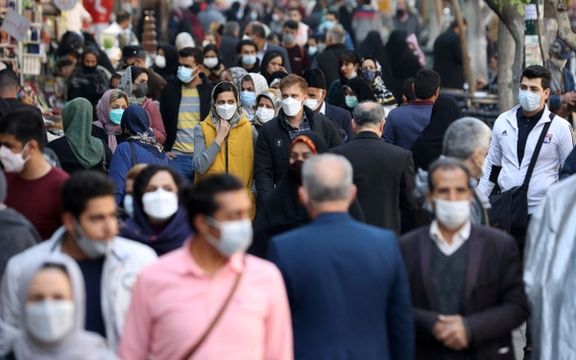
Two former senior diplomats in Iran have explained their vision about how the country will look like in 2050, emphasizing good governance, as it faces multiple crises.
Their conversation with Sharq newspaper, published on March 5, was recorded before the Russian invasion of Ukraine, obviously, without considering developments sparked by the ensuing international crisis.
Both diplomats are now working in academic and energy fields. Ali-Akbar Salehi was Iran's Foreign Minister (2009-2010) and (2011-2013) and nuclear chief (2013-2021). Abbas Maleki was the head of the Foreign Ministry's think-tank, the International Studies Center and deputy foreign minister (1980-1997).
Sharq's reporter Zeynab Esmaili, asked whether in 30 years Iran will be a developed country or a poor state crippled by water shortages and environmental crises, as current condition point to. Salehi said it is difficult to predict, however, it is a matter of good governance. If the government is not bothered by the needs of the people, one could say for sure that the country has no future.
In the 1979 revolution the people wanted a change in the style of governance and wanted to get rid of despotism, Salehi said. The chaos brought about by the revolution continued with debates about whether political reforms were more important or economic development. Should progress be put before economic justice? Or justice before freedom? Was freedom more important than security?
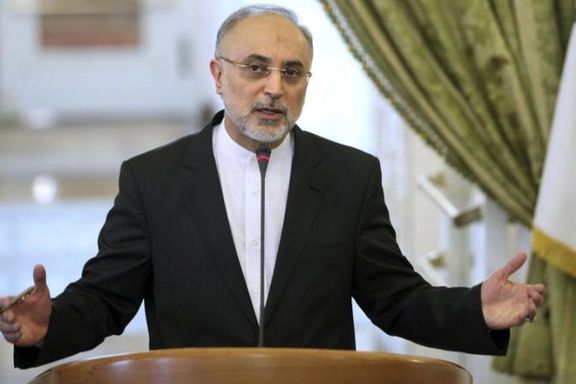
Salehi’s emphasis on good governance belies a general perception in Iran that the Islamic Republic has pursued harmful policies for too long and its ability to propel the country toward prosperity is highly questionable.
Salehi emphasized that having large oil reserves is not a substitute for good governance.
“Our roadmap to the future should be based on good governance, knowledge, democracy and attending to the needs of the middle class,” he said.
Maleki also emphasized good governance and the importance of planning. “Plans tell us where we are headed,” he said. So, if we wish to be at a certain point in 2050, we should start working today. But Maleki stressed that government control is better than leaving affairs in the hands of the private sector, claiming that Iran’s response to natural disasters have been more efficient than in the United States where private companies run the infrastructure, such as power and water.
International surveys of economic performance contradict the view that Iran’s government and economic system perform reasonably well.
Maleki also emphasized that developing fossil fuel resources are important for Iran’s near future.
Salehi agreed with Maleki by saying that oil and gas can revive Iran. “We have one percent of the world's landmass but 11 percent of its oil and 17 percent gas resources,” he said. There is no value in these resources unless we turn them into an engine of development. There are gigantic gas and oil reserve under Bandar Lengeh, but the port city has no pipelines. We should turn the reservoirs of Yadavaran and Azadegan oil fields into money. And there are a lot of resources still untouched in the northern part of Iran. Energy is capital but it is not endless. It will end one day. So, Iran should use it rationally.
However, looking at the record, Iran has sold well over one trillion dollars of oil in the past four decades but because of its centrally controlled economy and inefficient governance it has little to show for it compared with regional counties such as Turkey that has no oil or the United Arab Emirates.
Asked why Iranians believe that the government has left them to their own devices or in other words has let them down. Salehi expressed hope that the system can still correct itself, but the young generation is mostly hopeless about the future of the country and they blame policies pursued in the past three decades since Supreme Leader Ali Khamenei has ruled the country.
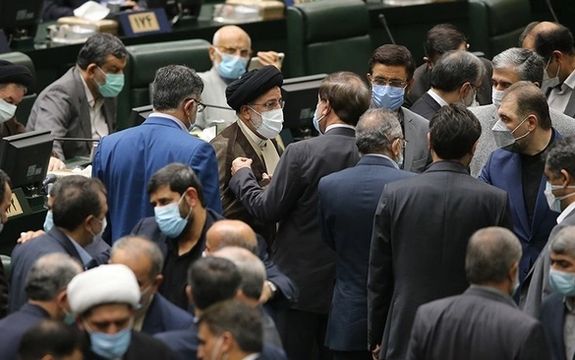
Iran’s parliament decided Saturday to give 3.5 billion euros of crude oil “to individuals” to sell on the world market and give the proceeds to the military.
The decision, part of the new budget, does not specify which individuals will receive the oil to sell, nor there is any mention of procedures to award the oil and receive the proceeds. The parliament only said that “guarantees” will be required before any oil is awarded.
A well-publicized scandal broke in 2013 when authorities arrested Babak Zanjani, a businessman, for embezzling at least $2.7 billion from illicit oil sales during international sanctions from 2009-2013. Zanjani used companies affiliated with the Revolutionary Guard (IRGC) for the oil he exported, leading to speculations that well-connected officials had a stake in the scheme. He received the death penalty which has so far not been carried out.
Similar corruption revelations in recent years have badly damaged the regime’s image in the country.
In February, the Revolutionary Guard received $80 million of oil from the government to sell as an additional budget appropriation. It also remains unclear who and under what conditions will export the oil amid US sanctions.
Many members of Iran's hardliner dominated parliament are former members of the IRGC.
President Ebrahim Raisi’s government awarded a contract worth $3 billion of oil with the business conglomerate of the IRGC for rice production, while it has no expertise in the field.
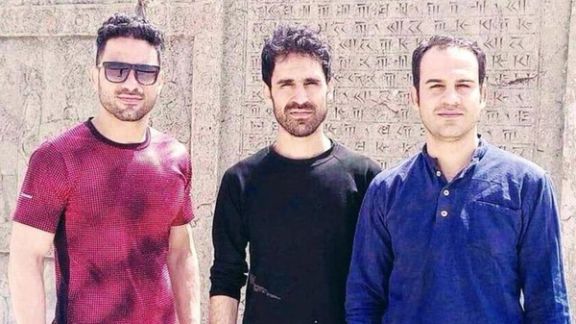
One of the brothers of the executed Iranian wrestler Navid Afkari has been released from prison but another brother, Vahid, is still in solitary confinement.
The family said in a tweet on Saturday that Habib Afkari was freed after months of solitary confinement.
Habib had been sentenced to 27 years and 3 months in prison and 74 lashes and was being kept in windowless solitary confinement cells since Navid’s execution in September 2020.
Vahid was sentenced to 54 years and 6 months in prison and 74 lashes and is still in solitary confinement.
Amnesty International said in June 2021 that Vahid and Habib were being subjected to torture and other ill-treatment in Adelabad prison in Shiraz, and were denied access to adequate healthcare, fresh air, telephone calls and face to face family visits.
Navid Afkari was arrested along with his brothers Habib and Vahid during protests in Iran in 2018 and was executed despite international campaigns to save his life.
He initially received a death sentence for an “act of war against God” for his participation in protests, the authorities later charged him and his brothers with the murder of a government employee.
According to the Oslo-based Iran Human Rights in September 2021, Shahin Naseri, a prisoner who testified that Navid Afkari was tortured to confess to killing a water company security guard in 2018, died in custody in Greater Tehran penitentiary “in suspicious circumstances”.
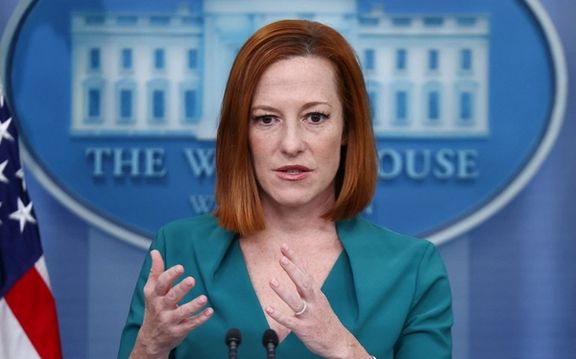
The White House Press Secretary Jen Psaki on Friday did not rule out importing Iranian oil once a nuclear deal is reached in Vienna, or lifting IRGC sanctions.
In her daily briefing to reporters, she was asked if an Iranian nuclear agreement in Vienna would “factor into the supply consideration at this point.”
Psaki replied that restoring the Obama era nuclear deal known as the JCPOA is the priority of the administration, but added, “Obviously, as a part of that, if you go back to the implementation of the JCPOA, would be the availability of oil. But — but I would say that our first-and-foremost priority focus is on preventing Iran from acquiring a nuclear weapon.”
Another reporter pressed the issue later in the briefing and Psaki responded, “Again, there’s not a — an Iran — there’s not a deal at this point in time. While we’re close, we’re not there. So, if and when we get to that point, we can speak to that question.”
The issue of the Biden administration’s position toward a possible purchase of Iranian oil came up on March 3, when Transportation Secretary Pete Buttigieg in response to MSNBC did not rule out the possibility, while many in the United States call for a boycott of Russian imports.
Critics reacted to Buttigieg’s remark that President Joe Biden wants “all options are on the table,” by saying that domestic sources must be the energy priority of the administration. “Using North American oil to decouple economic dependency on the resources of hostile nations is a long-term solution,” Representative Ralph Norman (R-SC) tweeted on Thursday.
Psaki also did not deny that the US is considering removing Iran’s Revolutionary Guard, IRGC, from the list of foreign terrorist organizations.
“Look, there — we are close. We are making progress. But we are — there’s still more work to be done, and I’m just not going to negotiate from here,” she said, avoiding a clear and direct answer to a question.
The Biden team had insisted all along that it is willing only to remove nuclear sanction imposed by former president Donald Trump, while Iran was demanding the lifting of all sanctions, including terrorism ones against the IRGC, some top officials and entities involved in supporting militant groups.
However, Gabriel Noronha, former Special Advisor for the Secretary's Iran Action Group in the Trump administration in a series of tweets on Wednesday quoted State Department, National Security Council and European Union unnamed officials as having authorized him to reveal that US Special Envoy for Iran Rob Malley was planning to lift IRGC sanctions.
The question directed to Psaki on Friday was a clear chance for her to comment on the issue, but she avoided giving an answer.
Critics of the administration’s policies toward Iran have expressed deep misgivings about lifting sanctions of individuals and entities who are accused or suspected of ties to terrorism, such as the bombing of a Jewish community center in Buenos Aires, Argentina in 1994 that killed dozens of people.
They also say that Iran organized and supported numerous attacks against US forces in Iraq in the past 19 years, including many drone and rocket strikes in 2021, by its proxy militias.